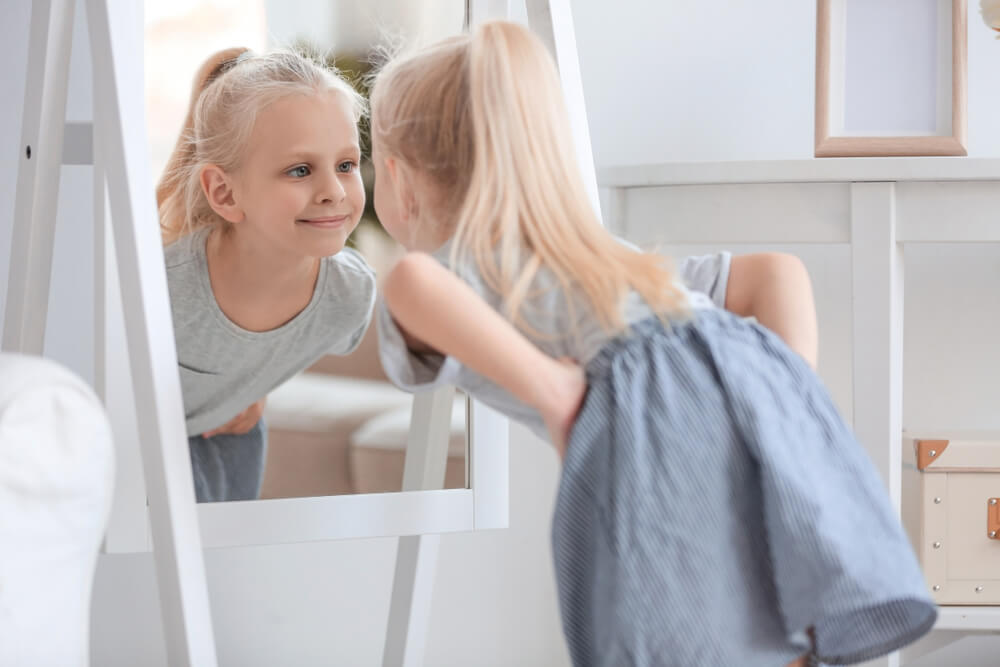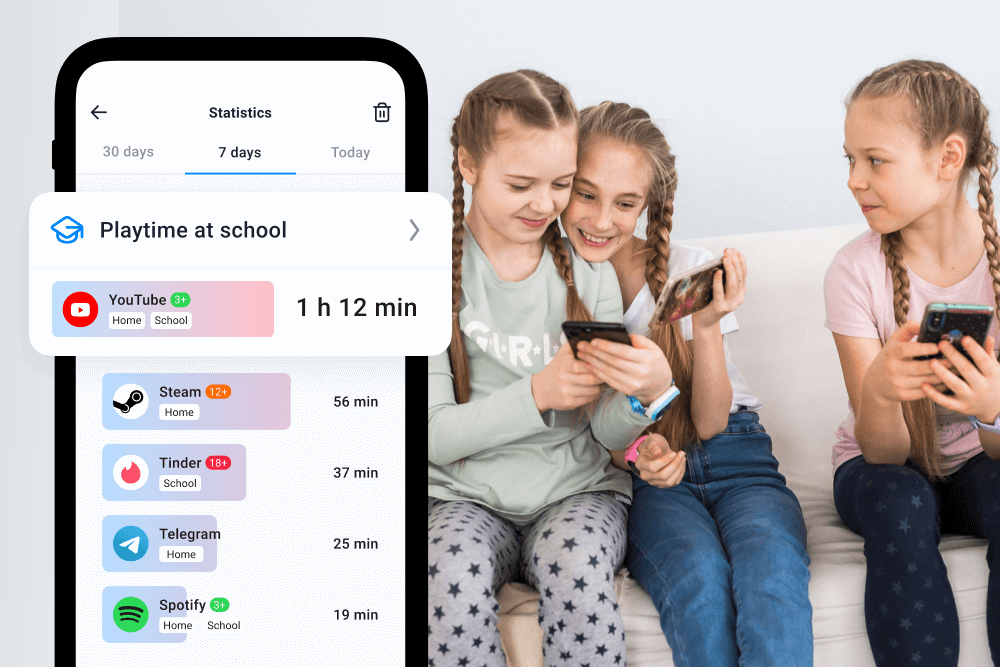Body Positivity for Kids: Tips for Parents

In today’s media-driven world, body image can significantly impact our children’s self-esteem. The pressure to conform to unrealistic standards can be harmful to their mental health.
Instilling body positivity from an early age is crucial to help them grow into confident individuals. In this article, we’ll explore why body positivity is essential and provide tips on how to support your child in developing a positive body image.
Learn how to help a child with body image issues and nurture their confidence!
Contents:
- What Is Body-Positivity & The Movement Behind It?
- Body-Positivity In Modern Children
- How To Promote Body Positivity to Your Child
- Body-Positivity Activities
- Your Child’s Body Confidence Matters
What Is Body-Positivity & The Movement Behind It?

Prostock-studio/Shutterstock.com
Body positivity is a term that refers to accepting all bodies. In other words, it’s a concept that promotes body diversity and pinpoints that everyone should feel comfortable in their own skin.
The idea is good, but feeling good about your body and having self-esteem regarding your appearance takes work. It’s why promoting body positivity for kids matters even more because you want them to remember that looks don’t matter, as long as they feel comfortable in their own skin.
Having a positive perception of one’s body image can help to remove any barriers to success in many areas of life—including career opportunities, friendships, and relationships.
The body-positive movement has grown massively over the last few years. The introduction of plus-sized models, as well as models with disabilities, has been a big step towards embracing different body types across many cultures.
As the body-positive movement progresses, children will be able to accept themselves for who they are and what they look like, leading to a more positive upbringing that isn’t coloured by the need to look “perfect”.
Body-Positivity In Modern Children

Pressmaster/Shutterstock.com
In the digital age, it’s not easy to achieve the acceptance of your own body. TV channels, social networks, and other media are promoting that only a slim body shape with muscles is acceptable.
Children are often exposed to influencers looking “perfect,” which can start affecting their positive body image, even at a young age. If you add the negative body talk that kids with extra pounds could face from their friends, that could lead to destroyed self-esteem and complexes regarding appearance.
Some kids become obsessed with their body shape and size. That could lead to extreme diets, eating disorders, and issues like social anxiety and depression.
The social media age is proving to have a negative impact on body confidence. Reports show that 53% of teens are unhappy with their body—growing to a staggering 78% when teens reach 17 years old.
The downsides of kids using modern technology are evident. Not just for overall mental and physical health, but also how our kids perceive themselves and their peers. This is why you must raise your child in a body-positive manner.
How To Promote Body Positivity to Your Child

Africa Studio/Shutterstock.com
Before we move on to tips, let’s mention that this won’t be an easy task. Promoting body positivity for kids will include regular conversations and positive body talk, as well as paying attention to your and their behavior.
Here are some steps you can take to raise your child to be body-positive.
#1 Praise Them For Their Appearance
No matter how your kids look, what they’re wearing, or the time of day, always mention to them how great they look. Although this may seem like an innocent passing comment, it can have a significant impact on how a child grows up and perceives themselves.
From an early age, you must encourage confidence in their appearance. By complimenting them regularly, this will help to solidify their body confidence.
#2 Avoid Saying Negative Comments About Yourself
Kids pick up a lot—if not almost everything—from their parents, including habits, behaviours, views on life, etc. This is why it’s essential to look at your body confidence and the comments you make about yourself.
If you’re continually talking about being overweight or underweight in front of your kids, they will inevitably pick up on this, and could begin to form these negative perceptions of themselves.
And if you have problems with extra pounds, try to engage in physical activity and focus on your positive efforts there. That way, you could also help your child understand the importance of a healthy lifestyle.
#3 Encourage A Healthy Lifestyle Instead Of Avoiding Body Issues

Prostock-studio/Shutterstock.com
Trying to avoid body issues, for example, suggesting that being overweight needs to be avoided, should be ruled out when you’re trying to bring up your child in a body-positive way.
Instead, you should encourage your child to live and eat healthily. Promote regular exercise and healthy eating, not to lose weight, but to stay healthy. Focusing on the positives (being healthy) will have a much more beneficial impact on your child’s perception of health and life than focusing on avoiding the negatives (being out of shape).
#4 Compliment Their Character and Emphasize Inner Beauty
Instead of solely praising physical appearance, acknowledge and celebrate your child’s positive qualities and actions. Compliment their kindness, empathy, creativity, resilience, and any other virtues they display.
Teach your child that true beauty extends far beyond physical appearance. Emphasize the importance of being kind, compassionate, and empathetic towards others. Encourage them to focus on their strengths, talents, and personal growth rather than superficial attributes
By focusing on these points, parents can help their children develop a healthy self-image and build strong self-esteem.
#5 Challenge Negative Self-Beliefs
Whenever you hear your child talk negatively about their appearance—either their facial features, body parts, or weight—you must challenge their view straight away.
Instantly refuting their claims that they’re out of shape or ugly, and ensuring them that they look amazing just as they are, will help to reduce your child’s negative thought patterns regarding their body image.
#6 Install the Findmykids app

Findmykids app
Findmykids is essentially a GPS tracker that can help monitor your child’s location, but it also has other functions that contribute to your child’s safety. The app’s features can be important for body positivity. If you use the Android app version, you can see mobile app usage statistics. Findmykids will tell you how much time your kid spends on social media, which can contribute to a negative self-image and affect their mental health.
Tracking your kid’s location will tell you if they are secretly eating, and you have the option to hear what’s going on in the child’s surroundings, which can be an imperative safety feature. If the child activates the SOS signal, the phone will record the environment. That could use as proof of bullying, or at least you’ll know which comments your child has been facing. It might make it easier to teach your child how to react when someone talks about their physical appearance.
Findmykids is available for Android and iOS, and there’s also a GPS watch with integrated parental control features.
#7 Look For Signs Of Bullying
Bullying is a huge problem, especially in the age of smartphones and social media. You need to make sure you stay on the lookout for any signs of bullying your child may be experiencing.
One of the best ways to do this is to encourage open conversations about your child’s experience at school and while they’re with their friends—ask what their relationship is like with their friends and if they’re having any issues at school.
Another way to ensure bullies aren’t victimizing your child is to use aparental control app that notifies you if your child is experiencing cyberbullying.
#8 Encourage Your Child To Share Their Concerns
Open communication between you and your child is vital. Be sure to let your child know that they can discuss any concerns they have with you, at any time.
Encouraging conversations about mental and physical wellbeing will enable your child to speak freely about their experience, and if they have concerns regarding their body image—which can be addressed as they arise.
#9 Call Out Stereotypes

Prostock-studio/Shutterstock.com
As the media always surround us, 1001 different stereotypes are often depicted on TV, in films, on social media, etc. Whenever you’re watching a TV program or movie with your child, point out obvious stereotypes, such as men and women with perfect bodies.
Explain to your child that these stereotypes aren’t always realistic, and society shouldn’t expect anyone to look like on-screen actors and models.
#10 Reduce Social Media Usage
Social media can be a massive catalyst for kids lacking body confidence. By limiting the amount of time your child spends on social media their exposure to perfect, stereotypical images of people will be significantly reduced. This will help your child not to compare themselves to others and instead spend time doing things that boost their body confidence.
You should pay attention to what kids publish on social media. Even if they now have body acceptance, they might receive insulting comments from their friends and followers. That could lead to negative self-talk and destroy the positive body picture they have. It’s why you should monitor who your kids’ friends are on social networks, and suggest that they don’t publish personal images and never use public profile settings.
To ensure your child’s online safety, restrict access to certain applications and set a limit on their use, use the Kids360 service!
Body-Positivity Activities

Prostock-studio/Shutterstock.com
There are many body-positive activities that you can encourage your child to do that will help them improve their perception of self and their overall confidence.
Positive Affirmations
Positive affirmations are a fantastic way to boost your child’s self-confidence. By getting them to continually reaffirm that their body is perfect and that they are worthy of confidence in their body image.
Affirmations will also help your child to love all that is unique about them—whether it’s facial features, their body type, parts of their body, etc.
Here are a few examples of body-positive affirmations that will help your child to become more confident about their body image:
- “My body is perfect”
- “I love how unique my body type is”
- “I look perfect no matter my body type”
- “I’m loved by my friends and family”
- “I completely accept who I am as a person”
- “Me and my body are worthy”
Positivity Journal
Using a positivity journal can also be a great way to help your child create a healthy image of their body and overall personality.
Get your kid to write 3 things that they love about themselves and their body, each night before they go to bed. Over time, this will help them to reconfigure their perception of themselves—focusing only on the positive aspects of their body and personality instead of the negatives.
Meditation

Prostock-studio/Shutterstock.com
Calming the mind and focusing on the positives in life can go a long way to not only improve body confidence by also to improve our lives overall. This is why it’s a good idea to introduce meditation to your child at an early age.
Get your child to practice simple meditation techniques regularly, such as clearing their minds and focusing on being present.
Positive affirmations can be incorporated into meditation sessions—which will enhance your child’s experience and help to strengthen their body-positive mentality further.
Encourage Sports & Other Activities
Partaking in sports can dramatically boost your child’s confidence, which in turn will help them to feel better about themselves and their bodies.
Encourage your kid to take up a sport or activity that interests them, whether it’s soccer, dancing, outdoor adventure sports, or some form of martial arts—all of which will have a dramatically positive impact on.
Exercise in the form of sport is also an excellent way for your child to keep fit as well as boost their confidence.
Related: Nudity at Home: Is it Okay to be Naked at Home Around Your Kids?
Here are some more body-positive activities for children:
- Body-Inclusive Art: Engage in art activities that celebrate diverse body types and beauty. Encourage your child to draw, paint, or create collages representing different body shapes, sizes, and features.
- Mindful Eating: Teach your child about mindful eating, focusing on enjoying food for nourishment and pleasure rather than dieting or restricting. Encourage them to listen to their body’s hunger and fullness cues.
- Media Awareness: Watch TV shows, movies, or online content together and discuss how bodies are portrayed. Help your child recognize unrealistic beauty standards and promote critical thinking about media messages.
Your Child’s Body Confidence Matters

Prostock-studio/Shutterstock.com
As we’ve discussed, body positivity is immensely important, especially in this modern age of TV and social media.
Studies reveal that many kids are unhappy with their appearance, which can lead to issues like depression and anxiety. Encouraging body positivity is crucial to prevent such problems and boost your child’s confidence.
Limiting social media use, praising their appearance, challenging negative beliefs, and promoting positive activities like affirmations and meditation can help your child feel comfortable in their own skin and build lasting confidence.
Проверьте электронный ящик



















